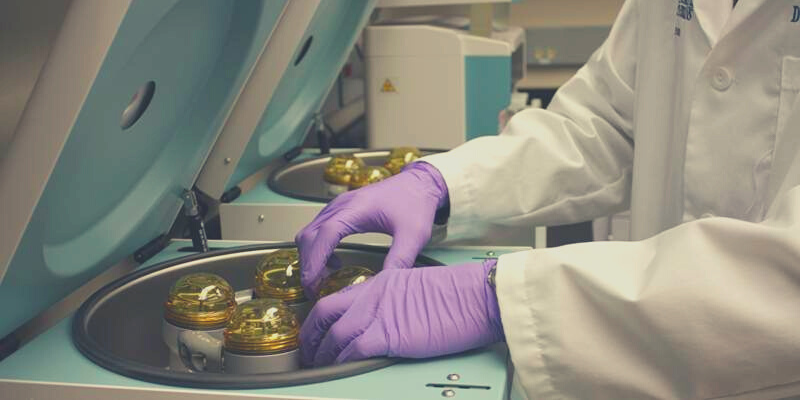For updated information on this project, visit the project page.
When biomedical research makes news, headlines often tout the findings: the exciting discovery of a new treatment, way to detect a disease, or new health guidance we’re advised to follow. What the headlines don’t show is that behind each “new” discovery is years, if not decades, of investigation, and an infrastructure within medical and research institutions that makes it all possible.
The majority of today’s new medical therapies have relied on specimens – such as cancer cells and tumors, blood samples, and other human tissues that hold both the mysteries and the keys to new knowledge.
“Certain research is just not possible unless you have access to clinical tissues,” said Hallgeir Rui, MD, PhD, WBCS Endowed Professor of Breast Cancer Research, vice chair of research in the Department of Pathology, and director of the Tissue Bank at the Medical College of Wisconsin.
The process to access, obtain patient consent, collect samples, and then store such tissues is complex and time consuming – and a reason that the leading research institutions often rely on centralized resources called biorepositories, tissue distribution centers, or tissue banks to make the rigorous process efficient.
“If you don’t have an organized tissue bank, it’s up to individual research investigators to find pathologists, surgeons, and clinicians to get, in a very disorganized manner, access to tissues,” said Rui. “Investigators can be successful in doing it, but it can be hard and time consuming.”
A decade ago, research investigators at the Medical College of Wisconsin labored through the process. Today, the MCW Tissue Bank serves as a core to the institution’s research advancements. Developed and launched with the support of a 10-year, $5.2 million AHW investment, the MCW Tissue Bank is key to MCW’s position as Wisconsin’s largest private research institution and its work to bring the latest in biomedical research advancements to the state.
In January 2020, the MCW Tissue Bank became one of only two College of American Pathologist (CAP) accredited biorepositories in Wisconsin, and one of only 65 nationwide who meet these rigorous standards.
“Accreditation is a quality stamp; an attestation to the rigor we have in place,” said Rui, who is quick to give credit to his predecessor, Saul Suster, MD, for initiating the MCW Tissue Bank development, and Manager Mary Rau for making the biorepository a model operation that is rapidly growing.
“When infrastructure like our tissue bank can make studies possible or more efficient for investigators, the knowledge from this accelerated research is what turns into new discoveries that advance treatments, diagnostics, and prevention. It’s what can save lives.” - Dr. Hallgeir Rui
Since specimen acquisition began in 2011, the MCW Tissue Bank has created three primary programs to meet the needs of MCW research investigators, including programs to support research on cancer and cardiovascular disease which are leading causes of death in Wisconsin.
As these programs have been developed, the biorepository has banked more than 54,400 individual tissue samples, more than 167,450 individual blood samples, and numerous other samples that today have supported nearly 300 MCW research investigators, including 159 ongoing studies.
This infrastructure allowed the MCW Tissue Bank to rapidly respond to COVID-19 – collecting tissues from COVID-19 patients that are now part of active research led by MCW investigators.
“If we didn’t have the Tissue Bank, these processes would not have been logistically feasible to set up as COVID-19 emerged,” said Rui.
At the heart of its mission, the MCW Tissue Bank is about making opportunities for new discovery possible for research investigators – and is a reason that as the Tissue Bank enters its next decade, Rui and his team are planning for the future, developing strategies to continue the tissue distribution while supporting investigators in new ways.
“It is a very costly endeavor to set up and run, to ensure that the quality and rigor in processes, operations, management, and equipment are there,” said Rui. “But it pays off in so many ways.”
The payoff can be found in research progress, published findings, grants for further studies, and recruitment and retention of leading scientists and clinicians.
“The best scientists want to go where their research is possible,” said Rui.
But the most critical impact is the one Rui saves for last: Improving health outcomes.
“When infrastructure like our tissue bank can make studies possible or more efficient for investigators, the knowledge from this accelerated research is what turns into new discoveries that advance treatments, diagnostics, and prevention,” said Rui. “It’s what can save lives.”
Find more information on this and other funded projects in the AHW Funded Project Listing





